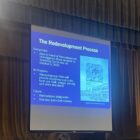When Mayor Nancy Adams mentioned at a meeting on Sept. 11 that a deal to purchase and develop the Maplewood Theater and other nearby properties had fallen through — a fact that had become common knowledge in recent weeks — applause erupted from the audience of approximately 150 local residents.
Over the course of two hours at a special meeting at The Woodland, numerous residents advocated for not just preserving the facade of the Maplewood Theater — as stipulated in the draft redevelopment plan under discussion — but the entire building, as well as requiring a significant percentage of space for a movie theater in the plan.
Mayor Nancy Adams repeatedly pointed out the the property was privately owned and that the township was limited in its powers.
But proponents of saving the theater pointed to an example in nearby Montclair that they asked Maplewood to emulate. Lily Hartman said, “I’ve been to all of these meetings and I think the applause was that everybody was breathing a sigh of relief.”
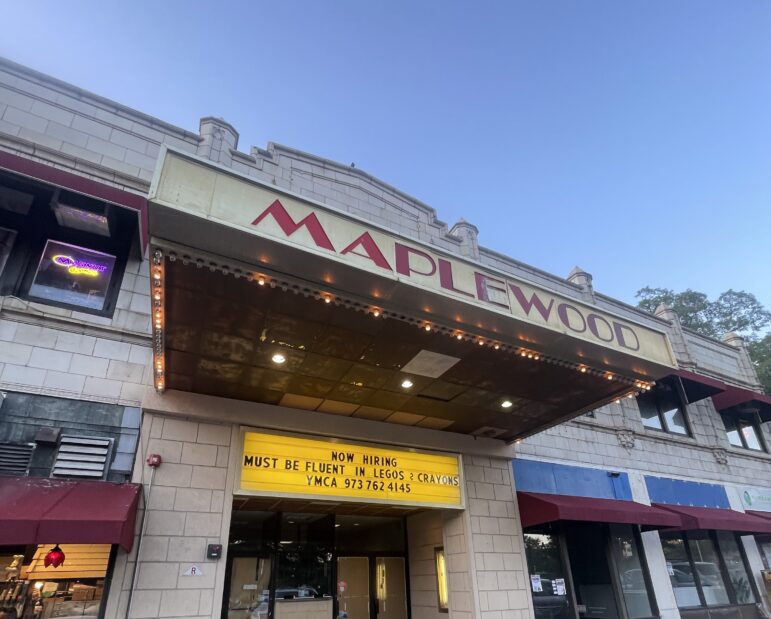
Hartman said attendees were relieved that the property would not turn into 100 units of housing “which was what was speculated was going to happen.” Adams pushed back on this, saying that not more than 60 units would have been allowed.
Hartman persisted: “I think it’s pretty clear from the first meeting that the majority of people want the theater preserved in some way and some kind of theater space. Not suggested, but required. And this is something that was done recently in Montclair with the Bellevue Theatre, which when the township did their planning development required, not suggested, but required 50% of the space be used for the theater. And they also preserved that historic building.”
Hartman asked, “Why can’t that be done here?”
The Bellevue Theatre in Montclair which has been shuttered since 2017, is now slated to be reopened by Montclair Film, which has signed a lease with the property owner. The President of the Montclair Film’s Board of Trustees is Evelyn Colbert, wife of Stephen Colbert.
According to Patch: “The Bellevue Theatre will become a nonprofit cinema and will be programmed and operated by Montclair Film, in concert with The Clairidge. Once reopened, the venue will operate as a full-time cinema, showing popular current releases as well as art house, independent, documentary, classic and foreign language films. Montclair Film said it hopes to launch this fall – just in time for the 2025 Montclair Film Festival. Full operation is scheduled to begin in early November ahead of the holiday season.”
Deborah Kaufman pointed to local celebrities: “I just would like to remind you all that we have a lot of theater people and movie people and famous people that’ve come out of Columbia High School that somehow I think we could reach out to the Jason Alexanders and the SZAs that all have occupied Maplewood and gone to the Maplewood movie theater growing up. I think somehow we could reach out to these people and see if Hollywood or the theater community would like to get together and make this happen for us.”
The Township’s planning consultant Paul Grygiel responded, “If that’s the case that you coordinate with a group that does this, that’s not precluded by any means, right? The second thing that is important is that a redevelopment plan, even though it’s a law that’s adopted, it can change. It can change between now and when it’s adopted after the fact. If something comes up that says, we’ve got a great opportunity. If someone’s willing to pony up the money or has a great plan, the Township Committee, I have a feeling, would be very receptive to hearing that and modifying it to be more strict.”
Grygiel continued, “We’re allowing for that kind of use. We’re allowing for mixed uses. But again, now’s the time to get the word out and try to impress upon your governing body to listen to you about that.”
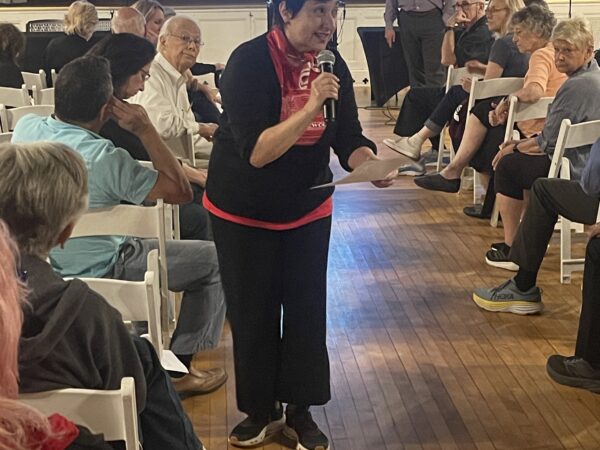
Angela Matusik of the Maplewood Film Society asked for more specific language in the redevelopment plan.
Angela Matusik of the Maplewood Film Society, which formed last year to advocate for the preservation of the theater, said that what Montclair did was achievable in Maplewood, but it needed to be intentional. She read from Montclair’s redevelopment plan for the Bellevue theater, citing, “The purpose of the Bellevue Theater Redevelopment Plan is to preserve both the movie theater use and its historic building. This requires a modern definition of movie theater that expands beyond the use of just movie screenings to compete with new media formats. The definition of a movie theater must be expanded to include a place for community gatherings and special events. In addition, multiple uses should be permitted within the building to provide a broader range of income sources to support the local movie theater operation.”
Matusik commented, “Upfront, nice and clear. They say it can be done. It can be done. And that’s what we are hoping to see here.”
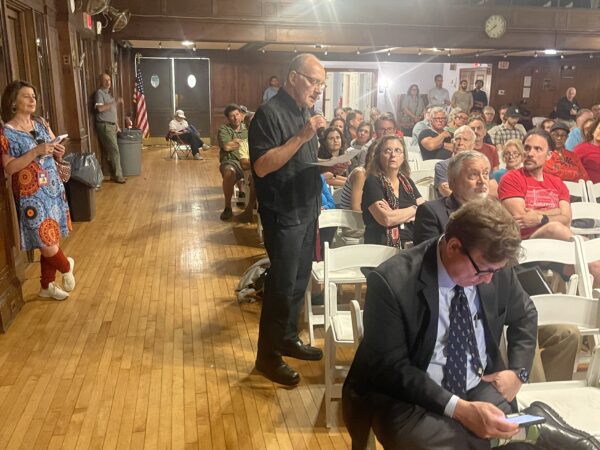
Tony Award-nominated Zack Grenier read a letter from the son of the theater’s architect.
Speaking of theater people, Tony-Award nominee and longtime Maplewood resident Zach Grenier stood to read a letter from the theater architect’s son Thomas C. Lehman: “My grand uncle William E. Lehman and my papa David J. Lehman, Will’s younger brother, were responsible for some great theater designs in our country. It is my best assumption that they put their heart and soul into creating a solution that would stand forever for people to enjoy history of the arts. Their strength in the perimeter wall construction and its structural frame, along with their unique entrances and ticket booths were second to none. The interior layouts and fascinating ceiling dome design and detailing artwork were simply breathtaking. Besides the Maplewood Theater, the original Count Basie Theater and the Brooks Art Center, to name just a couple, were clear architectural examples of my family’s theatrical designs.”
The letter continued, “All types of development are important today to allow progress to continue. However, these historic buildings, which are generally not duplicated today in their detail, should be protected so that all generations to come shall have the opportunity to share with their family’s history — no different than the history behind the Great Pyramids or any building of such magnificent historical meaning. I hope to be able to take my grandchildren to visit the Maplewood Theater and others, not only to share our family connection, but to explain how important it is to keep our art, architecture and its beauty intact. I hope I will have this opportunity.”
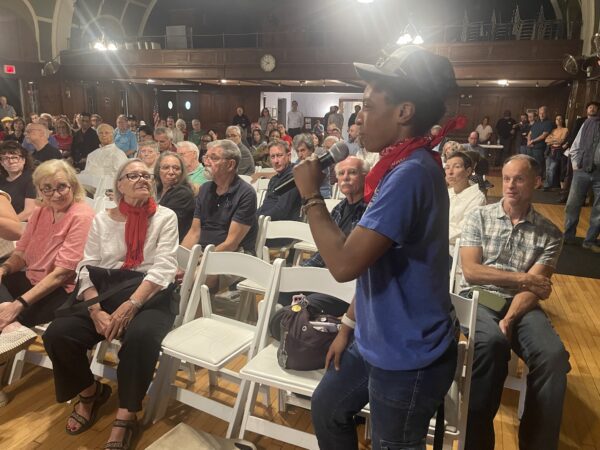
Mariah Steele saw her first movie the Maplewood Theater and misses the activity it brought to the Village.
Mariah Steele, a 27-year resident of Maplewood, has been going to the Maplewood Theater her entire life.
“The theater has been one of my favorite places to go. The first movie I watched here was Son of the Mask in 2005. I remember all the laughs, everything. … That’s the very first theater that I watched a movie in ever. And that makes it super special.” She said that during the pandemic, she waited patiently for the theater to open again, “but then it didn’t happen.”
With the loss of the Village at SOPAC theaters in South Orange, Steele said, “We don’t have anywhere nearby just locked down to watch movies anymore. And it is really sad.” She noted, “There really was more foot traffic when the theater was open and you could go and have a dinner afterwards or sit on the benches. It was a really nice spot.”
The Presentation
The first 20 minutes of the meetings entailed Adams and Grygiel presenting the redevelopment plan and noting some updates to the plan that were made since the last public meeting one year ago.
“One thing that has been added since the last meeting based on feedback from the Village Alliance, is a series of redevelopment plan goals,” said Grygiel. “And these were essentially drafted by the MVA and presented to the consultants, township committee and town administrator. And based upon review, we said these make a lot of sense. They’ve really hit the nail on the head with some guiding principles for the redevelopment area redevelopment project.”
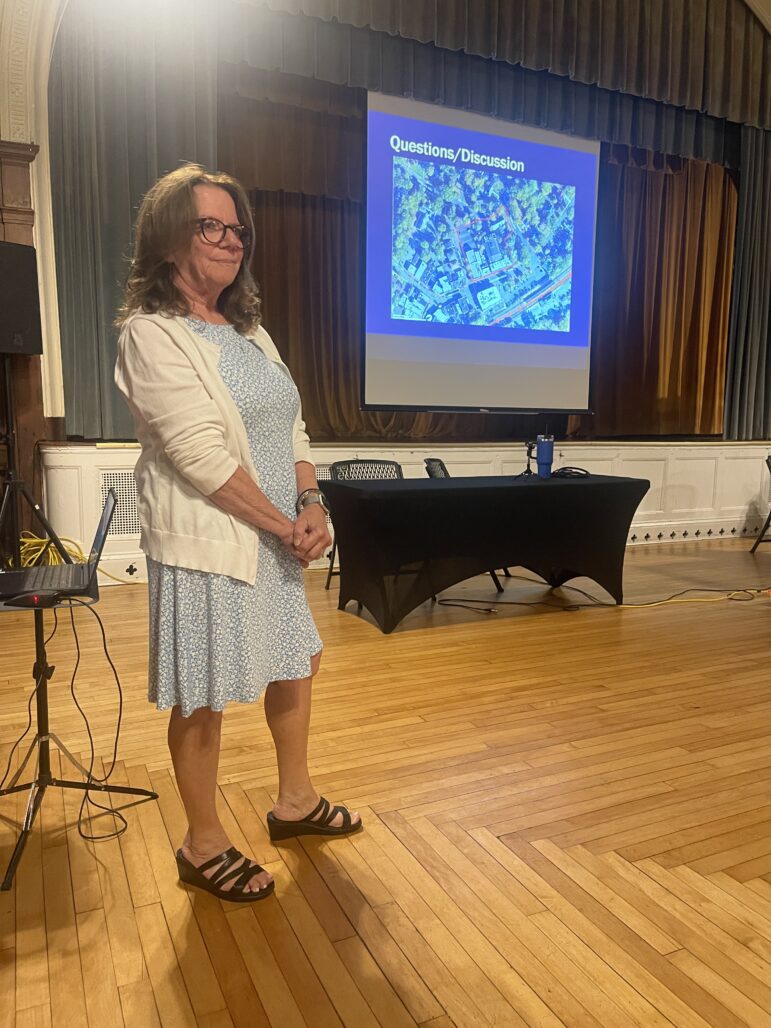
Mayor Nancy Adams
Grygiel contimued, “The first one is high quality architecture, contextually appropriate, visually compatible and consistent in scale and character. Second one, thoughtful placement. Ground floors promote vibrant human oriented public space, including a continuous, vibrant and varied small scale retail street wall like grade. Again, getting into more planner type terms to basically say to continue what you have already into the Village — storefronts along sidewalks, active spaces that provide people in and provide activity. Green infrastructure and sustainable design is the next one. And lastly, carefully preserve historically significant architecture. In particular, we talk about the bank building and movie theater facades.”
Later Grygiel address the historic review process.
“A number of changes pertain to historic preservation. The Historic Preservation Commission or HPC weighed in a number of times and gave us a number of comments. So we clarified the Commission’s review procedures as well as what the Planning Board’s review process is. We made sure it’s clear that our redeveloper can request an informal meeting with the HPC to get input and feedback on any plan, something they have. It’s clarified that demolition review is by the Village Alliance and not the HPC.”
“So we’re making it clear that’s the MVA’s duty and obligation,” said Grygiel.
Grygiel said another change was stipulating that the township could obligate the property owner or redeveloper to meet certain deadlines to meet financial agreements.
Next Steps
Grygiel said that feedback from the meeting would be reported back to the Township Committee, with the next likely next step to refer the plan to the Maplewood Planning Board for its review. “At that point, the planning board will provide comments [and] has the ability to weigh in on consistency with the Master Plan and make any other recommendations” and send the plan back to the township committee. “At that point, if the members believe the plan is ready or want it either modified to do so, or keep it as is, introduce it as an ordinance, this would be a law that would replace the existing zoning.”
Through that series of meetings and hearings both at that Township Committee and the Planning Board, Grygiel assured the public that there would be more opportunities for public comment.


